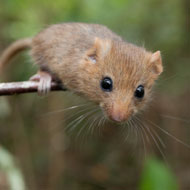
PTES and partners in bid to halt population decline
Conservationists are releasing 19 breeding pairs of rare hazel dormice into a woodland location in Warwickshire today (20 June).
The project, led by the People’s Trust for Endangered Species and partners, is part of a drive to halt the decline in this endangered species. Hazel dormice are now extinct in 17 English counties and populations continue to dwindle, owing to the loss of woodland and hedgerow habitat, as well as changes to traditional countryside management practices.
Ian White, PTES’ dormouse officer, said: “Our dormouse conservation work involves managing a nationwide dormouse monitoring scheme, coordinating annual reintroductions and advising land owners about empathetic land management practices.
“The reintroductions are important for the long-term conservation of this species, as we’re restoring dormice to counties where they’ve been lost so that they can thrive again. This is a great start in beginning to combat their decline. Our approach also benefits a whole raft of other species including birds, bats and butterflies.”
The dormice being released were captive bred by the Common Dormouse Captive Breeders Group. Prior to their release today they spent six weeks in quarantine at the Zoological Society of London (ZSL) and Paignton Zoo in Devon, where vets conducted a full health check to reduce the risk of them spreading non-native diseases.
Dormice will then be released to an undisclosed woodland location in breeding pairs or trios in their own wooden nest box, fitted inside a mesh cage secured to trees. The mesh cages are filled with food and water and help the animals to acclimatise to their new wild home. In about 10 days’ time, the cages will be opened to allow the dormice out into their new woodland home. The cages will eventually be removed once the animals have settled into the wood.
This reintroduction follows a successful release of 46 hazel dormice at Windmill Naps in Warwickshire in 2009. A future reintroduction is also planned at a woodland near the 2017 release site, in order to link the hedgerows between the two dormouse hotspots, so that the two groups will be able to interbreed.
Image © Clare Pengelly



 RCVS Knowledge has welcomed Professor Peter Cockcroft as editor-in-chief for Veterinary Evidence.
RCVS Knowledge has welcomed Professor Peter Cockcroft as editor-in-chief for Veterinary Evidence.